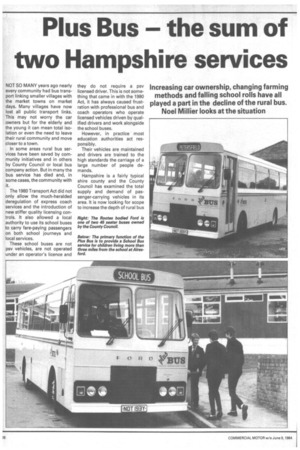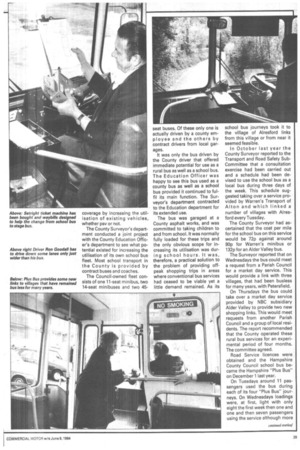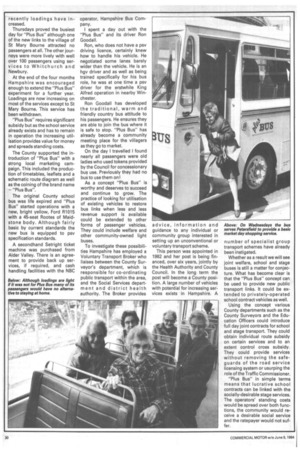Plus Bus the sum of two Hampshire services
Page 30

Page 31

Page 32

If you've noticed an error in this article please click here to report it so we can fix it.
NOT SO MANY years ago nearly every community had bus transport linking smaller villages with the market towns on market days. Many villages have now lost all public transport links. This may not worry the car owners but for the elderly and the young it can mean total isolation or even the need to leave their rural community and move closer to a town.
In some areas rural bus services have been saved by community initiatives and in others by County Council or local bus company action. But in many the bus service has died and, in some cases, the community with it.
The 1980 Transport Act did not only allow the much-heralded deregulation of express coach services and the introduction of new stiffer quality licensing controls. It also allowed a local authority to use its school buses to carry fare-paying passengers on both school journeys and local services.
These school buses are not psv vehicles, are not operated under an operator's licence and they do not require a psv licensed driver. This is not something that came in with the 1980 Act, it has always caused frustration with professional bus and coach operators who operate licensed vehicles driven by qualified drivers and work alongside the school buses.
However, in practice most education authorities act responsibly.
Their vehicles are maintained and drivers are trained to the high standards the carriage of a Large number of people demands.
Hampshire is a fairly typical shire county and the County Council has examined the total supply and demand of passenger-carrying vehicles in its area. It is now looking for scope to increase the depth of rural bus coverage by increasing the utilisation of existing vehicles, whether psv or not.
The County Surveyor's department conducted a joint project with the County Education Officer's department to see what potential existed for increasing the utilisation of its own school bus fleet. Most school transport in the County is provided by contract buses and coaches.
The Council-owned fleet consists of one 11-seat minibus, two 14-seat minibuses and two 45 seat buses. Of these only one is actually driven by a county employee and the others by contract drivers from local garages.
It was only the bus driven by the County driver that offered immediate potential for use as a rural bus as well as a school bus. The Education Officer was happy to see this bus used as a county bus as well as a school bus provided it continued to fulfil its main function. The Surveyor's department contracted to the Education department for its extended use.
The bus was garaged at a County asphalt works, and was committed to taking children to and from school. It was normally fully loaded for these trips and the only obvious scope for increasing its utilisation was during school hours. It was, therefore, a practical solution to the problem of providing offpeak shopping trips in areas where conventional bus services had ceased to be viable yet a little demand remained. As its school bus journeys took it to the village of Alresford links from this village or from near it seemed feasible.
In October last year the County Surveyor reported to the Transport and Road Safety Sub Committee that a consultation exercise had been carried out and a schedule had been de vised to use the school bus as a local bus during three days of the week. This schedule sug gested taking over a service provided by Warren's Transport of Alton and which linked a number of villages with Airesford every Tuesday.
The County Surveyor had ascertained that the cost per mile for the school bus on this service would be 72p against around 90p for Warren's minibus or 132p for an Alder Valley bus.
The Surveyor reported that on Wednesdays the bus could meet a request from a Parish Council for a market day service. This would provide a link with three villages, that had been busless for many years, with Petersfield.
On Thursdays the bus could take over a market day service provided by NBC subsidiary Alder Valley to provide two new shopping links. This would meet requests from another Parish Council and a group of local residents. The report recommended that the County operated these rural bus services for an experimental period of four months. The committee agreed.
Road Service licences were obtained and the Hampshire County Council school bus became the Hampshire "Plus Bus" on December 1 last year.
On Tuesdays around 11 passengers used the bus during each of its four "Plus Bus" jour neys. On Wednesdays loadings were, at first, light with only eight the first week then one and one and then seven passengers using the service although more recently loadings have increased.
Thursdays proved the busiest day for "Plus Bus" although one of the new links to the village of St Mary Bourne attracted no passengers at all. The other journeys were more lively with well over 100 passengers using services to Whitchurch and Newbury.
At the end of the four months Hampshire was encouraged enough to extend the "Plus Bus" experiment for a further year. Loadings are now increasing on most of the services except to St Mary Bourne. This service has been withdrawn.
"Plus Bus" requires significant subsidy but as the school service already exists and has to remain in operation the increasing utilisation provides value for money and spreads standing costs.
The County supported the introduction of "Plus Bus" with a strong local marketing campaign. This included the production of timetables, leaflets and a schematic route diagram as well as the coining of the brand name — "Plus Bus".
The original County school bus was life expired and "Plus Bus" started operations with a new, bright yellow, Ford R1015 with a 45-seat Rootes of Maidstone body. Although fairly basic by current standards the new bus is equipped to psv specification standards.
A secondhand Setright ticket machine was purchased from Alder Valley. There is an agreement to provide back up services, if required, and cash handling facilities with the NBC operator, Hampshire Bus Company.
I spent a day out with the "Plus Bus" and its driver Ron Goodall.
Ron, who does not have a psv driving licence, certainly knew how to handle his vehicle. He negotiated some lanes barely wider than the vehicle. He is an hgv driver and as well as being trained specifically for his bus role, he was at one time a psv driver for the erstwhile King Alfred operation in nearby Winchester.
Ron Goodall has developed the traditional, warm and friendly country bus attitude to his passengers. He ensures they are able to join the bus where it is safe to stop. "Plus Bus" has already become a community meeting place for the villagers as they go to market.
On the day I travelled I found nearly all passengers were old ladies who used tokens provided by the Council for concessionary bus use. Previously they had no bus to use them on!
As a concept "Plus Bus" is worthy and deserves to succeed and continue to grow. The practice of looking for utilisation of existing vehicles to restore bus links when less and less revenue support is available could be extended to other forms of passenger vehicles. They could include welfare and other community-owned light buses.
To investigate these possibilities Hampshire has employed a Voluntary Transport Broker who liaises between the County Surveyor's department, which is responsible for co-ordinating public transport within the area, and the Social Services department and district health authority. The Broker provides advice, information and guidance to any individual or community group interested in setting up an unconventional or voluntary transport scheme.
This person was appointed in 1982 and her post is being financed, over six years, jointly by the Health Authority and County Council. In the long term the post will become a County position. A large number of vehicles with potential for increasing services exists in Hampshire. A number of specialist group transport schemes have already been instigated.
Whether as a result we will see joint welfare, school and stage buses is still a matter for conjecture. What has become clear is that the "Plus Bus" concept can be used to provide new public transport links. It could be extended to privately-operated school contract vehicles as well.
Using the concept various County departments such as the County Surveyors and the Education Officers could introduce full day joint contracts for school and stage transport. They could obtain individual route subsidy on certain services and to an extent control cross subsidy. They could provide services without removing the safeguards of the road service licensing system or usurping the role of the Traffic Commissioner.
"Plus Bus" in simple terms means that lucrative school contracts can be linked with the socially-desirable stage services. The operators' standing costs would be spread over both functions, the community would receive a desirable social service and the ratepayer would not suffer.
























































































